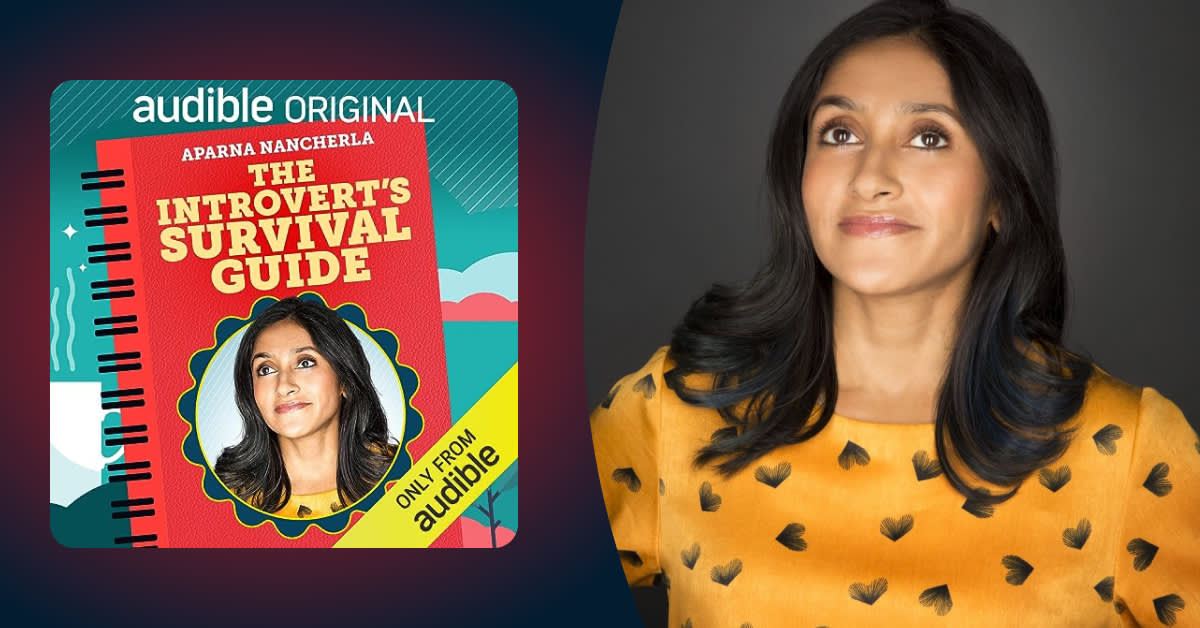If you find yourself drained from social interactions, practicing internal monologues while keeping mum during meetings, and needing extra alone time to recharge, then you just might be an introvert.
In Aparna Nancherla’s Audible Original podcast, , the comedian interviews fellow successful homebodies—such as social justice advocate Deepa Iyer, social media influencer Elyse Myers, and actor Seth Meyers—to hear how they navigate a world built for extroverts. Here, we asked Aparna about her experience as a paradoxically shy stand-up and what she wants outgoing people to know about reserved personalities.
Rachael Xerri: When did you first realize you were an introvert?
Aparna Nancherla: I can’t pinpoint when I first heard the term—probably middle or high school—though I didn’t readily embrace my introversion until well into my 30s. A fashionably late bloomer! But I don’t know a time when I haven’t had a vast internal landscape that I’m more drawn to than whatever’s going on outside of it. As a kid, I was both very shy as well as naturally drawn to books and my imagination, though I saw my lack of social endurance as something to be overcome. Now I find it a relief to be able to retreat from the world as needed and have that space for myself. For better and for worse, the inner sanctum is never closed.
You’re a comedian by trade—how has your introversion shaped your career?
I tend to observe the world with a little distance, thanks to both my introversion and an anxious brain. This is a great way of sopping up everyday details and minutiae, which are my favorite things to write about in comedy. As humans, we get so caught up in the bigger-scale events of our lives such as milestones and accomplishments, and beginnings and endings. My fascination has always been with the middles and the process, maybe because it’s where so many of us spend all our time. I have also needed to draw certain boundaries around how much socializing I have the capacity for, especially in show environments, which can be both exciting and engaging, as well as overstimulating and draining. There’s always a recharge required on the other side of performing for me.
I don’t know a time when I haven’t had a vast internal landscape that I’m more drawn to than whatever’s going on outside of it.
What have you learned about yourself from the guests in this series?
That introverts are all around us, whether we realize it or not, and there’s ways to ask more from the world when you don’t always feel like you fit in, rather than always changing yourself to accommodate others. There’s no one set of rules that every introvert can go by for gauging their own needs and boundaries, but it’s OK to make room for yourself without shouting about it. But, at the same time, remembering that extroverts can’t always read our minds and sometimes we do have to get outside of our own heads enough to let others in. Introverts value connection just as much as extroverts do—it’s just the ways we find it might not look the same.
What do you hope other introverts take away from The Introvert’s Survival Guide?
More self-acceptance and compassion for themselves in a world that doesn’t always make that easy. Realizing you might not always be understood and that’s OK too—there are others like you closer than you think going through the same thing. Celebrating the way you relate to others rather than judging it, of course, easier said than done (though sometimes introverts are better at doing than saying, so maybe not).
Introverts are all around us, whether we realize it or not, and there’s ways to ask more from the world when you don’t always feel like you fit in, rather than always changing yourself to accommodate others.
And extroverts? What effect do you hope this guide has on them?
A better understanding of how introverts engage with the world and more empathy and respect for their needs and limits. Understanding that some people don’t have the same social appetites or needs in the workplace or their personal relationships as others, and realizing that this can feel like “swimming upstream” against certain social and cultural norms. In short, an open mind!
Last question: Do you have a favorite listen of 2023?
I really enjoyed by Leigh Bardugo, a juicy sequel in the that falls under the fantastical dark academia genre. What can I say? I’m a sucker for demons in libraries.
